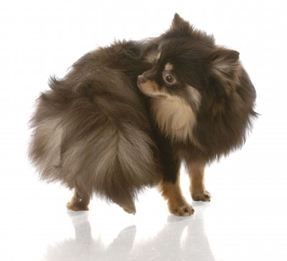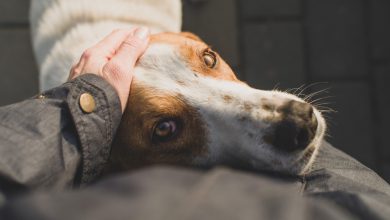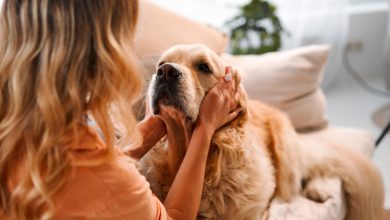
Handling abnormal dog behavior is something we may be faced with from time to time, so keep these tips in mind if you are faced with the problem in the future.
There are many different types of abnormal dog behavior, and sometimes it is pretty difficult to determine whether your dog is really acting abnormally, or it is just a common behavior in your dog. Sometimes the best way to find out is to ask your vet about it. Your dog may have some health problems that are causing such abnormal behavior. For instance, if your dog often chases its tail, there’s a good chance it has a medical problem that needs checking out. However, if there are no medical problems, there are always ways of training your dog to get rid of such abnormal behaviors.
Handling Abnormal Dog Behavior
Detrimental Behavior
- Detrimental, or destructive behavior is characterized by the dog that loves to destroy your house and always make a mess out of things. Your dog could very well be filled with too much energy. Like many other behaviors, it can be treated with regular exercise, like a walk. However, in many cases it is due to excessive energy, so letting them run may be the best solution, especially for adolescent and working dogs. If you like to jog, take the dog. If you’re more sedentary like me, play fetch or frisbee until the dog is worn out. The side benefit is, your dog will have a great chance of staying healthy throughout its life.
- If you have the problem of your dog ruining things in your house while you are away, you can try to give him a diversion – something that will keep him busy. Bring him his favorite toys for him to play with or bury somewhere in the yard, or you can give him food to munch while you are away. Interactive toys are also available – you can try getting one for your dog.
Compulsive Behavior
- Like the detrimental behavior, compulsive behavior often roots from your dog having excessive and uncontrolled energy. This is most commonly found in dogs that have spent a long time in a shelter. It includes chasing light, spinning, and chewing themselves, and you probably need the advice and maybe medical treatment / therapy from your vet. This behavior can be stopped by training, and needs to be started as soon as this type behavior appears. Distraction/diversion is the usual best treatment. For example, when he begins to chase light, divert him with another command, or when he starts to chew himself, redirect him to chewing a toy or a bone.
Aggressive Behavior
- Aggressive behavior is very dangerous and can often lead to attacks on other animals or humans. Discipline must be administered instantly if it is inappropriate for the situation. Discipline him properly by voice commands, and reward him with treats when he obeys your command. Use a leash, but never physically abuse him. Whenever your dog becomes aggressive, give him a command that diverts him from being aggressive and give him a reward afterwards.
Anxiety-Related Behavior
- This occurs when your dog has a certain fear or abnormal anxiety, which is often displayed in whining, hiding, barking or destroying things. With this, you need to reduce your pet’s anxiety first by showing him/her some loving actions. You can also have a room for your dog filled with his favorite things, and things that will please him and make him forget about his fear. You can also try a DAP diffuser, which releases calming hormones for your dog, and unless it is a severe problem, only turn it on while you are away.
- You can also find out what he is afraid of. In case of thunderstorms, try getting him used to the sound by playing a CD of the thunderstorm sound (or any sound that he is afraid of), and gradually increasing the volume until he gets used to it without fear. If it doesn’t seem to work, try again by increasing the sound levels much more slowly. Even stretching it out over several days will be worth the effort and patience.
Fortunately, most of the time handling abnormal dog behavior can be accomplished by the owner with plenty of love and the proper techniques. But, most of all, tons of patience.
Do you have any special tricks or techniques you use when your dog is being a weirdo? If so, please share them below!



